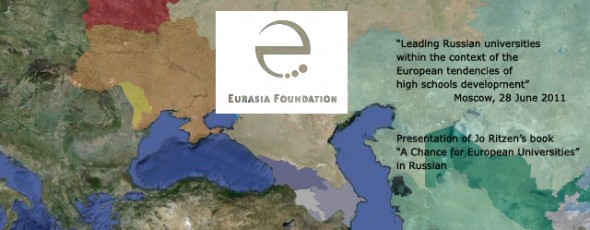Moscow, 28 June 2011
Notes on the Conference “Leading Russian universities within the context of the European tendencies of high schools development”
The presentation of the Russian translation Jo Ritzen’s latest book “A chance for European Universities” in Moscow on June 28, 2011, was also an opportunity for Russian policymakers and university presidents to discuss the state of art of the internationalisation of HE in their country. The event was organised by the Association of Russian Leading Universities (ARU) and the New Eurasia Foundation and welcomed several representatives of European higher education organisations present in Russia, such as the Dutch NUFFIC and the German DFG.
Among the participants of the discussion were, on one side, Igor Protsenko, director of International Integration in the Ministry of Education and Science, Andrey Kortunov, president of the New Eurasia Foundation, and Irina Arzhanova, executive director of the National Training Foundation. On the other hand participated Charls Hoedt, director of Nuffic Neso Russia, Jörn Achterberg, director of the DFG Office Russia/CIS, and Tobias Stüdemann, head of the Moscow office of the Freie Universität Berlin.
After the introduction and Jo Ritzen’s presentation, an intense debate ensued on the panel. The main topic, the position of Russian universities in the context of globalised higher education, was like a bright spotlight poured on all problems Russian universities suffer from today. The shape of university autonomy, of equal opportunities and regional differentiation of universities were some of the discussed issues. The Russian panellists pointed out that they feel having fallen behind 15 years losing scientists to foreign countries, losing pace in modernising laboratories, and in developing modern, competitive university administrations. A common tenor of the participants in regard to the proposals exposed in Jo Ritzen’s book was: “Your problems we’d like to have!”
The Russian situation proves to be difficult also in respect of domestic political discord where part of the government and the rectors of the 39 leading universities wish to foster structural modernisation – more financial and administrative autonomy of universities and a Russian higher education environment that is more open to international exchange – and others, first and formemost prime minister Vladimir Putin, who intend to keep them in a firm grip of the State.
In retrospect, Jo Ritzen concluded that the Russian higher education sector has a great interest in mantaining the momentum of co-operation with its European counterparts and that the impact of intensified exchange would be beneficial to create a foreward-looking Russian higher education policy.
Further information:
- Programme of the conference
- Slides of Jo Ritzen’s presentation
- Report of the meeting, ASI, 29/06/2011 (Google translation)
- Summary of the meeting, DFG
- Article on the foundation of the Association of Russian Leading Universities (ARU), S&TRF, 01/06/2011 (Google translation)
- Activities of the ARU, American Councils, 14/05/2011
- Homepage of the New Eurasia Foundation




